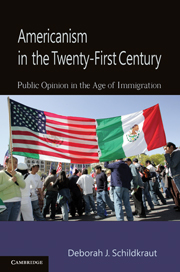Book contents
- Frontmatter
- Contents
- Figures and Tables
- Acknowledgments
- 1 Introduction: American Identity in the Twenty-First Century
- 2 The Twenty-First-Century Americanism Survey
- 3 Defining American Identity in the Twenty-First Century
- 4 Policy Implications of Multidimensional Americanism
- 5 The Myths and Realities of Identity Prioritization
- 6 Does “Becoming American” Create a “Better” American?
- 7 Immigrant Resentment: When the Work Ethic Backfires
- 8 The Politics of American Identity
- Appendix A 21-CAS Survey Questions
- Appendix B Supplementary Tables from Chapter 3
- Appendix C Supplementary Tables from Chapter 5
- Appendix D Supplementary Tables from Chapter 6
- Appendix E Supplementary Tables from Chapter 7
- References
- Index
5 - The Myths and Realities of Identity Prioritization
Published online by Cambridge University Press: 05 June 2012
- Frontmatter
- Contents
- Figures and Tables
- Acknowledgments
- 1 Introduction: American Identity in the Twenty-First Century
- 2 The Twenty-First-Century Americanism Survey
- 3 Defining American Identity in the Twenty-First Century
- 4 Policy Implications of Multidimensional Americanism
- 5 The Myths and Realities of Identity Prioritization
- 6 Does “Becoming American” Create a “Better” American?
- 7 Immigrant Resentment: When the Work Ethic Backfires
- 8 The Politics of American Identity
- Appendix A 21-CAS Survey Questions
- Appendix B Supplementary Tables from Chapter 3
- Appendix C Supplementary Tables from Chapter 5
- Appendix D Supplementary Tables from Chapter 6
- Appendix E Supplementary Tables from Chapter 7
- References
- Index
Summary
Previous chapters examined claims that our increasing racial and ethnic diversity is making the United States a place with less and less “there, there.” Those examinations led to the conclusion that such claims are overblown. Few differences were found in how people from a variety of backgrounds define what being American means. Differences related to immigration, including nativity, were essentially gone with subsequent generations. By the time people are third- and fourth-generation American, they are, for the most part, equally likely to value the liberal, civic republican, and incorporationist underpinnings of American national identity. Even among people from Mexico, the target of the most vehement critics, most differences in how people define American identity were at the margins; the similarities between Mexicans and non-Mexicans were more noteworthy than their differences. For instance, 74 percent of foreign-born Mexicans agreed that true Americans should think of themselves as American and feel American compared to 73 percent of U.S.-born Mexicans and 81 percent of the rest of the sample. Moreover, the most striking differences between subgroups of Americans were partisan and ideological rather than racial or ethnic.
But there is more to the concerns raised by immigration critics about the consequences of our increasing diversity. Critics sound alarms not just about whether the newest Americans believe in core national values but also about the extent to which they live up to those values. The civic republican ideal of connecting one's own sense of self to the broader political community is especially relevant here. In particular, concerns arise over whether people do come to think of themselves primarily as American, or as American at all, even in combination with some other identity. The claim is that they do not, and that this lack of identification will in due time yield instability or worse. As Patrick Buchanan charges, “millions [of immigrants] bring no allegiance to America and remain loyal to the lands of their birth. And though they occupy more and more rooms in our home, they are not part of our family. Nor do they wish to be” (2006).
- Type
- Chapter
- Information
- Americanism in the Twenty-First CenturyPublic Opinion in the Age of Immigration, pp. 94 - 127Publisher: Cambridge University PressPrint publication year: 2010



